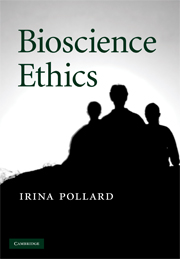Book contents
- Frontmatter
- Contents
- Preface
- Acknowledgements
- 1 Human origins, natural selection and the evolution of ethics
- 2 Sex determination, brain sex and sexual behaviour
- 3 Inappropriate lifestyle and congenital disability in children: basic principles of growth, toxicology, teratogenesis and mutagenesis
- 4 Substance abuse and parenthood: biological mechanisms – bioethical responsibilities
- 5 Fertility awareness: the ovulatory method of birth control, ageing gametes and congenital malformation in children
- 6 Understanding child abuse and its biological consequences
- 7 The state of wellbeing: basic principles, coping strategies and individual mastery
- 8 The state of wellbeing: on the end-of-life care and euthanasia
- 9 Current reproductive technologies: achievements and desired goals
- 10 The recombinant DNA technologies
- 11 Stem cells, nuclear transfer and cloning technology
- 12 Human-dominated ecosystems: re-evaluating environmental priorities
- 13 Human-dominated ecosystems: reclaiming the future for following generations
- 14 Human-dominated ecosystems: warfare = fitness enhancement or losing strategy?
- 15 Human-dominated ecosystems: reworking bioethical frontiers
- Further reading
- Index
8 - The state of wellbeing: on the end-of-life care and euthanasia
Published online by Cambridge University Press: 17 February 2010
- Frontmatter
- Contents
- Preface
- Acknowledgements
- 1 Human origins, natural selection and the evolution of ethics
- 2 Sex determination, brain sex and sexual behaviour
- 3 Inappropriate lifestyle and congenital disability in children: basic principles of growth, toxicology, teratogenesis and mutagenesis
- 4 Substance abuse and parenthood: biological mechanisms – bioethical responsibilities
- 5 Fertility awareness: the ovulatory method of birth control, ageing gametes and congenital malformation in children
- 6 Understanding child abuse and its biological consequences
- 7 The state of wellbeing: basic principles, coping strategies and individual mastery
- 8 The state of wellbeing: on the end-of-life care and euthanasia
- 9 Current reproductive technologies: achievements and desired goals
- 10 The recombinant DNA technologies
- 11 Stem cells, nuclear transfer and cloning technology
- 12 Human-dominated ecosystems: re-evaluating environmental priorities
- 13 Human-dominated ecosystems: reclaiming the future for following generations
- 14 Human-dominated ecosystems: warfare = fitness enhancement or losing strategy?
- 15 Human-dominated ecosystems: reworking bioethical frontiers
- Further reading
- Index
Summary
Caring control takes place when medical professionals or public health authorities refuse to act according to the patient's wishes, or they restrict the patient's freedom or in other ways attempt to influence the patient's behavior, allegedly in the patient's own best interest.
The previous chapter focused on the biological basis of happiness and wellbeing; this chapter focuses on justice and freedom when the process of dying has already begun. Freedom can be seen as the ability to decide for ourselves what happens in our lives without excessive constraints; that is, being in control. Of course, as social creatures, we are never totally free, even when we are not actively hindered from doing what we wish to do. The defining attributes of freedom have always collided with age-old debates on the meaning and value of human life which, in the contemporary context, have fuelled passionate discourse about the significance of abortion and euthanasia. Many contend that it is morally wrong to terminate an unwanted pregnancy or to give a lethal injection to a terminally ill patient who wishes to die expeditiously and without excessive pain. In the latter context, the act of euthanasia is understood as termination of life on request. Pro-life proponents see euthanasia as violating the principle of the sanctity of human life. Others maintain that such an inflexible stance is socially destabilizing because it is based on doubtful ethical principles and inaccurate understanding of the power of modern medicine.
- Type
- Chapter
- Information
- Bioscience Ethics , pp. 135 - 144Publisher: Cambridge University PressPrint publication year: 2009

